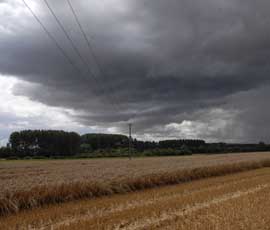Torrential rain hits harvest effort

Farmers in Scotland and the north-east of England are facing yet another wet harvest, with torrential rain causing flooding over the past week.
In Morayshire, Martin Bridges had been unable to combine properly for almost a fortnight. “We had 42mm at the weekend, and 24mm on Wednesday (10 August); the ground is really wet now, so I don’t know what’s going to happen when we do get back to combining.”
He had already noticed some ear disease in both the spring barley and winter wheat due to the rain. “We’ve had almost a fortnight of being able to do almost nothing; and have only had a few days when the temperature has got above 18C. It’s been a terrible summer – again.”
In the borders, Neil Thomson had not turned a wheel on the combine since Tuesday (9 August) at Caverton Mill, Kelso. “The ground conditions are going to be our next concern; it’s going to be difficult to travel. Already people have been investing in heavy ropes to pull their combines out of holes.”
Further south, Geoff Alderslade was waiting to combine milling wheat at West Fellgate Farm, Wardley, Tyne and Wear. “We have had a lot of rain – it just seems to be never-ending,” he said. “The Hagbergs will be starting to suffer; it really needs to stop raining now.”
But in Yorkshire, Derek Lamplough hadn’t even started harvest at Manor Farm, Scarborough, with two inches of rain falling over the past week. “We haven’t had the worst of it; there has been flooding at Stamford Bridge and Goole.” Winter barley quality was not yet suffering, but the crops would not stand much more rain, he said. “The other problem is that all the crops are going to be ready together.”
The rest of England had also not escaped lightly, with showers frustrating farmers’ attempts to combine for much of the week. In Lincolnshire, Chris Hewis had not cut anything for a week at The Grange, Habrough, and wheat quality was starting to suffer.
“The Grafton wheat was ready to go last Friday (5 August), at 15.8% moisture, but by the time the combine was ready it was raining, and it’s been raining ever since.” The crops were losing their colour, and bushelweights would have been affected, he said. “And we’ve still got straw left out where the barley was; we just can’t get it baled.”
The delayed harvest had prompted a revival of harvest premiums for wheat which was cut and ready to move, said David Sheppard, managing director of Gleadell Agriculture. “Harvest has been a stop-start affair, with the emphasis on stop the further north you go. Maybe 20% of the crop has been cut with quality issues, mainly confined to lower Hagberg. Group one and two wheats have mainly been of good quality but, other than in the spot position, millers have stepped out of the market till they see more of the crop.”

